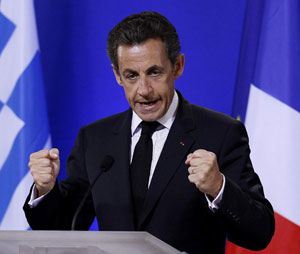|
 |
|
France's President Nicolas Sarkozy holds a news conference after a Euro Zone leaders summit in Brussels, May 8, 2010. [Agencies] |
|
 |
|
France's President Nicolas Sarkozy holds a news conference after a Euro Zone leaders summit in Brussels, May 8, 2010. [Agencies] |
With Spain and Portugal's fragile financial systems already pounded by markets in the wake of the Greek debt crisis, Sarkozy and Merkel laid out a plan to defend all euro nations against aggressive market movement.
"The euro is an essential element of Europe. We cannot leave it to speculators," Sarkozy said following nine hours of emergency talks by leaders from eurozone nations.
Eurozone chief Jean-Claude Juncker underscored the urgency of the threat by saying that even the staunchly independent European Central Bank was on board to help out with the operation after Jean-Claude Trichet huddled with Sarkozy and Merkel just before the summit.
"The ECB will want to contribute" to the mechanism, he said.
"We are talking about a global attack against the euro, and the eurozone must react as one," Juncker said.
Sarkozy said European finance ministers will hold another emergency meeting Sunday to work out specifics of the anti-speculation plan.
The urgency of Sunday's hastily arranged Ecofin meeting is the first clear indication that fears of contagion are coming true, with the crisis that emerged from Greece starting to affect other eurozone countries.
The fighting words from Sarkozy and Juncker were another.
Spain and Portugal are beginning to show the same signs of trouble that Greece was three months ago, with borrowing costs increasing, talk of speculative attacks and increasing concern among European partners that some form of help could be required.
"There's no reason, no fundamental reason in the economy to make such suspicions about our sovereign debt," said Portuguese Prime Minister Jose Socrates.
The summit, originally called to sign off on a bailout plan for Greece and draw lessons for the future, turned into one of crisis management amid market turmoil.
Financial markets have continued to sell off the euro and Greek bonds even as EU leaders have insisted for days that the Greek financial implosion is a unique combination of bad management, free spending and statistical cheating that doesn't apply to other euro-zone nations.
Beyond immediate measures to protect the euro, several leaders at the meeting said they want to impose punishing budgetary rules which would force member nations walk a tight budgetary line and avoid the kind of cheating and overspending that led to Greece's problems.
Several leaders, including Sarkozy and Merkel, insisted the near-collapse of Greece and subsequent market moves against other eurozone nations underscored that the framework of rules for managing the euro needed revamping, according to officials close to the talks.
To deal with the crisis, some also wanted a deeper involvement of the European Central Bank.
"We must sharpen the edge" of the rules to keep wayward governments in line, Merkel said, adding the 16 eurozone leaders should also consider changes to the 1992 treaty that laid the groundwork for the shared currency. "Otherwise, it won't work, in my opinion."